day and date(六年级英语总复习)
6A复习-节日
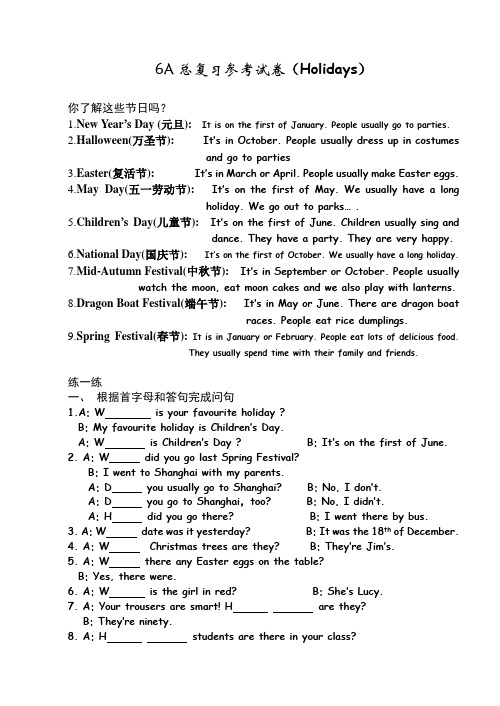
6A总复习参考试卷(Holidays)你了解这些节日吗?1.New Year’s Day (元旦): It is on the first of January. People usually go to parties.2.Halloween(万圣节):It’s in October. People usually dress up in costumesand go to parties3.Easter(复活节):It’s in March or April. People usually make Easter eggs.4.May Day(五一劳动节): It’s on the first of May. We usually have a longholiday. We go out to parks… .5.Children’s Day(儿童节):It’s on the first of June. Children usually sing anddance. They have a party. They are very happy.6.National Day(国庆节):It’s on the first of October. We usually have a long holiday.7.Mid-Autumn Festival(中秋节):It’s in September or October. People usuallywatch the moon, eat moon cakes and we also play with lanterns.8.Dragon Boat Festival(端午节):It’s in May or June. There are dragon boatraces. People eat rice dumplings.9.Spring Festival(春节):It is in January or February. People eat lots of delicious food.They usually spend time with their family and friends.练一练一、根据首字母和答句完成问句1.A: W is your favourite holiday ?B: My favourite holiday is Children’s Day.A: W is Children’s Day ? B: It’s on the first of June.2. A: W did you go last Spring Festival?B: I went to Shanghai with my parents.A: D you usually go to Shanghai? B: No, I don’t.A: D you go to Shanghai,too? B: No, I didn’t.A: H did you go there? B: I went there by bus.3. A: W date was it yesterday? B: It was the 18th of December.4. A: W Christmas trees are they? B: They’re Jim’s.5. A: W there any Easter eggs on the table?B: Yes, there were.6. A: W is the girl in red? B: She’s Lucy.7. A: Your trousers are smart! H are they?B: They’re ninety.8. A: H students are there in your class?B: There are thirty-five.9. A: W do people eat moon cakes and watch the moon?B: Mid-Autumn Festival.二、选择()1. Did you your relatives and friends last Spring Festival?A. visitsB. visitC. visited( ) 2. People usually watch the moon the Mid-Autumn Festival .A. forB. atC. to( ) 3. It was a funny film. all liked it very much.A. WeB. YourC. Us( ) 4. We usually spend time our family.A. inB. toC. with( ) 5. The Spring Festival is in January February.A. orB. andC. to( ) 6. The students are very excited.A. getB. gotC. getting( ) 7. When is the Dragon Boat Festival?A. In May.B. In June.C. In May or June.( ) 8. When is Halloween?A. In October.B. In July.C. In November.( ) 9. Which festival do people eat rice dumpling?A. Dragon Boat Festival.B. Mid-Autumn Festival.C. Easter.( )10. Did you go to a party last New Year’s Day ?A. Yes, I do.B. Yes, we did.C. No, we don’t.三、根据中文提示完成对话1. A: When’s (儿童节) ?B: It’s (在六月一日) .A: What do people usually do?B: They (唱歌和跳舞).2. A: What holiday comes after Christmas?B:and (元旦、春节).3. A: What’s your favourite (节日)?B: I like (中秋节)?A: When is it ?B: It’s in (九月或十月).A: (你赏月了吗?) ?B: Yes, I did.四、回答问题1. When’s Halloween?.2. What do people usually do at Halloween?.3. Did you go to a party last Halloween?.4. When’s our National Day?.5. Where did you go last National Day?.6. What’s your favourite holiday?.7. Do you usually eat lots of delicious food?.8. Is Christmas in December or January?.五、阅读理解A rich man decide(决定)to give his mother a birthday present. “My present will be better than any of my brother’s, ”he thought. He heard about an amazing(令人惊异)bird. The bird could speak five languages(语言).He bought the bird at once and sent it to his mother. It cost(花费)him 100 yuan.The day after her birthday, he called his mother.“How did you like the bird, mother?”he asked eagerly(亲切地).His mother answered“delicious!”A. 判断()1. The rich man bought his mother a birthday present.( ) 2. The rich man had only one brother.( ) 3. The rich man gave his mother a cheap (便宜)present.()4. The bird was very dear.()5. From the story we know the rich man’s mother ate the bird.B. 回答问题,注意表达完整1. Does the man have any brothers?.2. Whose birthday is it ?.3. What present did the rich man give his mother ?.4. How much is the bird ?.5. Did his mother eat the bird ?.C. 填空A rich man his mother a abirthday . The bird could speak language. It cost 100 . His mother like the bird. She the bird.六、根据提示写话,写你最喜欢的节日A: What’s your favourite holiday?B: … .A: When’s … ?B: It’s in … .A: What do people usually do at … ?B: They … .A: Did you … last…?B: Yes, I did. / No, I didn’t.。
川教版小学英语六年级毕业总复习资料

川教版小学英语六年级专项总复习专题一、词汇一、学习用品pen钢笔pencil铅笔ruler尺子bag包book书eraser橡皮crayon蜡笔sharpener卷笔刀pencil-box铅笔盒school bag书包.二、书籍newspaper报纸post card明信片magazine杂志comic book漫画书story-book故事书Chinese book语文书math book数学书notebook笔记本English book英语书dictionary词典二、身体部位foot脚head头face脸hair头发nose鼻子mouth嘴eye眼睛ear耳朵arm手臂hand手finger手指leg腿tail尾巴三、颜色$red红blue蓝yellow黄green绿white白black黑pink粉红purple紫orange橙brown棕四、动物(animals)cat猫dog狗pig猪duck鸭cow奶牛frog 青蛙tadpole蝌蚪tortoise乌龟chicken小鸡rabbit兔horse马elephant大象ant蚂蚁fish鱼bird鸟snake蛇mouse老鼠bear熊lion狮子fox狐狸deer鹿panda熊猫hen母鸡cow奶牛donkey驴lamb小羊sheep绵羊goat山羊tiger老虎monkey猴)zebra斑马giraffe长颈鹿rat小老鼠shark鲨鱼Caterpillar毛虫duckling小鸭子squirrel松鼠parrot鹦鹉butterfly蝴蝶Dragonfly蜻蜓insect昆虫swallow燕子bat蝙蝠火鸡Turkey五、人物friend朋友people人物baby婴儿kid小孩parents父母mother母亲father父亲mom妈妈dad爸爸grandparents 祖父母grandma/grandmother(外)祖母grandpa/grandfather(外)祖父aunt姑姑uncle叔叔sister姐妹brother兄弟son儿子daughter女儿man男人woman女人boy男孩girl女孩,Mr.先生Miss小姐Ms女士,夫人pen pal笔友student学生classmate同学水果类:Apple苹果orange橙子lemon柠檬peach桃子梨子pear 香蕉banana 葡萄grape 芒果mango草莓strawberry 樱桃cherry 荔枝litchis 西瓜watermelon,六、职业teacher教师student学生doctor医生nurse护士engineer工程师police警察cleaner清洁工worker工人driver司机farmer农民waiter服务员singer歌唱家writer作家actor男演员actress女演员artist画家policeman(男)警察postman邮递员TV reporter电视台记者七、交通工具bike自行车bus公共汽车train火车boat小船ship轮船car小汽车taxi出租车jeep吉普车Truck货车subway/地铁motor cycle摩托车plane飞机-八、地点/场所home家:room房间bedroom卧室bathroom卫生间kitchen厨房living room起居室washroom卫生间study书房school学校:classroom教室teacher’s office教师办公室Library图书馆art room绘画教室computer room计算机教室music room音乐教室playground操场canteen食堂Post office邮局police office警察局hospital医院factory工厂cinema电影院bank银行farm农场bookstore书店zoo动物园garden花园park公园pet shop宠物商店supermarket超市bookstore书店gym体育馆the Great Wall长城bus stop公交车站!country国家village乡村city城市hometown家乡九、课程Chinese语文math数学English英语课science科学Moral Education思想品德课Social Studies社会课.体育课music音乐art美术sports体育运动十、国家、城市(China/PRC中国America/USA美国England/UK英国Canada/CAN加拿大Australia澳大利亚New York纽约London伦敦Sydney悉尼New Zealand 新西兰France 法国Paris 巴黎Hong Kong香港Japan日本十一、大自然flower花grass草tree树seed种子plant 植物rose玫瑰leaf叶子rain雨cloud白云sun太阳wind风snow雪stream小溪river河流lake湖泊star星星moon月亮十二、星期)Mon. =Monday星期一Tues.= Tuesday星期二Wed.=Wednesday星期三Thur.=Thursday星期四Fri.= Friday星期五Sat.=Saturday星期六Sun.=Sunday星期天weekend周末week星期、周weekday工作日十三、月份Jan. (January) 一月Feb.(February)二月Mar.(March)三月April四月May五月June六月July七月Aug.(August)八月Sept.(September)九月Oct. (October) 十月Nov.(November)十一月Dec.(December)十二月十四、季节spring春summer夏fall/autumn秋winter冬十五、方位south南north北east东west西left左边right右边straight成直线的十六、患病have a fever发烧have a cold感冒have a cough咳嗽have a toothache牙疼have a headache头疼[have a stomachache 胃疼、肚子疼ill生病十七、数词:基数词one一two二three三four四five五six六seven七eight八nine九ten十eleven十一twelve十二thirteen十三fourteen十四fifteen十五sixteen十六seventeen十七eighteen十八nineteen十九twenty二十thirty三十forty四十fifty五十sixty六十seventy七十eighty八十ninety九十hundred百'序数词first第一second第二third第三fourth第四fifth第五eighth第八ninth第九twelfth第十二twentieth第二十thirtieth第三十fortieth第四十fiftieth第五十sixtieth第六十seventieth第七十eightieth第八十ninetieth第九十fifty-sixth第五十六十八、方位介词in在……里on在……上;在……时候under在……下面near在……的旁边behind在……后边next to与……相邻over在……上面in front of在……前面at 在……点!on the left在左边on the right在右边二十、心态情绪happy高兴的excited兴奋的angry生气的bored 无聊的sad悲伤的tired疲劳的二十一、动词过去式watch----watched 看wash---washed洗clean---cleaned打扫visit---visited看望do---did做go---went去!read---read读,看learn---learned学习eat---ate吃take---took照climb---climbed爬sing—sang唱歌dance---danced跳舞see---saw看见buy---bought买row—rowed划study---studied学习swim—swam游泳have—had有、吃return—returned归回fly---flew放prepare—prepared准备walk---walked步行jump---jumped跳leave---left离开play---played玩relax—relaxed放松get—got到达come—came来run—ran跑二十二、时间`表一般现在时:this morning(今天上午) this afternoon(今天下午)this evening (今天晚上) every day 每天表将来的:next week(下周) next weekend下周末next year明年next month下个月next Sunday下星期天表过去的:last weekend上个周末last week上周last year去年last month上个月last Sunday上个星期天three days ago三天前二十三、书籍comic book(漫画书) post card(明信片) newspaper(报纸) magazine(杂志)dictionary(字典)Chinese-book(语文书) English-book(英语书) math-book(数学书)note-book(笔记本) story-book(故事书) English-book(英语书)—二十四、Hobby(爱好)ride a bike--riding a bike(骑自行车) go swimming-- going swimming去游泳play the violin—playing the violin(拉小提琴)Fly a kite-flying a kite放风筝playing basketball打篮球二十五、第三人称单数Look-looks(看) feel-feels(感觉起来)smell-smells闻起来Taste-tastes尝起来sound-sounds听起来get-gets(到达,抵达)live –lives(居住) read--reads(读,看)teach--teaches(教) go--goes(去) watch--watches(看)>Do-does做have-has有,吃,喝二十六、形容词比较级更高的shorter更矮的younger更年轻的older更老的stronger更强壮的longer更长的smaller更小的更廋的hotter更热的bigger更大的fatter 更胖的更重的funny-funnier更有趣的easy-easier更容易的early-earlier更早的happy-happier更开心的pretty-prettier更漂亮的ugly-uglier更丑的更好的bad-worse更坏的expensive-more expensive更贵的difficult-more difficult更困难的二十七、三餐-breakfast早餐lunch午饭dinner晚饭二十八、疑问副词1.What is it(它是什么)2. What colour is it(什么颜色)day is it today(问今天星期几)’s the date today(问某月某日)’s the weather today(问天气)|is the matter with you你怎么了=What’s wrong with you is it(它怎样)time is it(几点)many boys are therein our class(我们班有多少个男生) much is the pen( 这只钢笔多少钱)How old are you(你几岁了)How about(怎么样)=what aboutWhen does she go to school(她什么时候去上学)Which dress is best(哪一条连衣裙最好)Where are you going(你将要去在哪里)Why do you like apples(你为什么喜欢苹果).Who is he他是谁Whose book is it它是谁的书When were you born你什么时候出生的二十九、频度副词(用在一般现在时态中)always(总是) usually(通常)often(经常)sometimes(有时候)never(从来不)三十、缩写形式:、1、. 上午2、.下午3、Entrance 入口4、Exit 出口5、1st第一2nd第二3rd第三4th第四7、What is=What’s 8、Who is=Who’s 9、can not=can’t10、do not=don’t 11、does not= does n’t 12、did not=did n’t13、you are=you’re 14、they are=they’re 15、I will=I’ll16、It is=it’s 17、She is=She’s 18、He is=He’s 19、I am=I’m食物:1、dumpling 饺子2、Zong Zi 粽子3、moon-cake 月饼[4、noodles面条5、fruit水果单位名称millimeter(mm)毫米centimeter(cm)厘米kilometer(km)千米foot英尺kilogram(kg)千克gram(g)克ton(t/tn)吨meter(m)米There Be 句型:1、A:Is there+单数名词……B:Yes,________No_________<2、A:Are there+复数名词……B:Yes,__________No,___________六年级上册句型1. How do you go to school (你怎样上学)I go by bike. (我乘自行车去。
六年级英语总复习资料内容
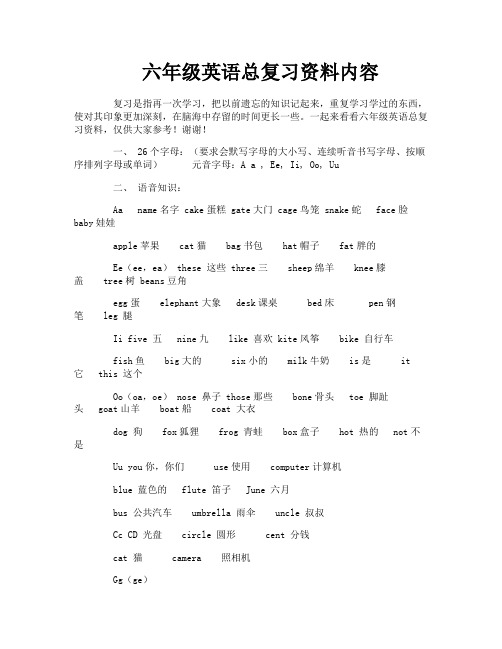
六年级英语总复习资料内容复习是指再一次学习,把以前遗忘的知识记起来,重复学习学过的东西,使对其印象更加深刻,在脑海中存留的时间更长一些。
一起来看看六年级英语总复习资料,仅供大家参考!谢谢!一、 26个字母:(要求会默写字母的大小写、连续听音书写字母、按顺序排列字母或单词)元音字母:A a , Ee, Ii, Oo, Uu二、语音知识:Aa name名字 cake蛋糕 gate大门 cage鸟笼 snake蛇face脸baby娃娃apple苹果 cat猫 bag书包 hat帽子 fat胖的Ee(ee,ea) these 这些 three三 sheep绵羊 knee膝盖 tree树 beans豆角egg蛋 elephant大象desk课桌bed床 pen钢笔 leg 腿Ii five 五nine九 like 喜欢 kite风筝 bike 自行车fish鱼 big大的six小的 milk牛奶 is是it它this 这个Oo(oa,oe) nose 鼻子 those那些 bone骨头toe 脚趾头goat山羊 boat船 coat 大衣dog 狗 fox狐狸 frog 青蛙 box盒子 hot 热的not不是Uu you你,你们use使用 computer计算机blue 蓝色的flute 笛子June 六月bus 公共汽车 umbrella 雨伞 uncle 叔叔Cc CD 光盘 circle 圆形cent 分钱cat 猫camera 照相机Gg(ge)orange 桔子 giraffe 长颈鹿page 页frog 青蛙 girl 女孩big 大的gate 大门th thin 瘦的 three 三thirteen 十三mouth 嘴mother 妈妈 father 爸爸 brother 兄弟 they 他们this 这个 that 那个feather 羽毛whwhat 什么 when 什么时候where 哪里why 为什么which 哪一个white 白色的water水 woman 女人walk 走who 谁whose 谁的ar car 汽车park 公园farm 农场arm手臂 star星星ir girl 女孩bird 鸟nurse护士purse 钱包 turtle 海龟third第三hurt 疼ow cow奶牛owl 猫头鹰house 房子mouse 鼠,鼠标cloudy 多云的oyoi boy 男孩 toy 玩具 oyster 贝壳oil 油coin 硬币 boil 沸腾oroor horse 马 store 商店 corn 玉米door 门floor 地板airear chair 椅子hair 头发 pear 梨bear 熊oobook 书 good 好的 look 看 foot 脚moon 月亮 food 食物pool 池子 room房间字母s或es的发音:字母s在词首发音为/s/, 在中间如:usually, television, treasure, casual中发音为/ /;以/p/, /t/, /k/ 清音收尾,读音为/s/;其他情况一般读音为/z/;以s, x, ch, sh 收尾加es的,es读音为/iz/。
六年级英语必考知识点大全

六年级英语必考知识点大全一、词汇部分1. 常见的动词短语- do homework 做家庭作业- go shopping 去购物- watch TV 看电视- have breakfast/lunch/dinner 吃早餐/午餐/晚餐- play sports 进行运动2. 时间和日期- days of the week 星期- months of the year 月份- telling time 说时间3. 数字和计数- cardinal numbers 基数词- ordinal numbers 序数词- counting objects 计数物品4. 问句和回答- 问候语 Greetings- 问路和指示方向 Asking for directions - 让步疑问句 Yes/No questions- 特殊疑问句 Wh-questions5. 常见动物及其特征- mammals 哺乳动物- birds 鸟类- fish 鱼类- reptiles 爬行动物- insects 昆虫6. 季节和天气- seasons 季节- weather 天气- 常见天气表达 Common weather expressions7. 学校用语- classroom objects 教室物品- school subjects 学科- school facilities 学校设施- school activities 学校活动二、语法部分1. 一般现在时- 表示客观真理或常规动作- 主语+动词原形2. 一般过去时- 表示过去发生的动作或状态- 主语+动词过去式3. 现在进行时- 表示现在正在进行的动作- 主语+be动词+动词-ing4. 一般将来时- 表示将来要发生的动作或状态 - 主语+will+动词原形5. 形容词和副词的比较级和最高级 - 形容词的比较级和最高级形式 - 副词的比较级和最高级形式6. 名词的单复数形式- 名词单数和复数的构成规则- 不规则名词的复数形式7. 人称代词和物主代词- 人称代词的主格和宾格形式 - 物主代词的形式和用法三、阅读理解部分1. 标题与主旨- 根据文章内容选择合适的标题 - 提炼出文章的主旨和中心思想2. 内容理解与推断- 根据文章提供的信息回答问题 - 推断文章中未提及的信息3. 词义理解- 根据上下文推测生词的意思 - 选择合适的近义词或反义词4. 文章结构与段落关系- 理解文章的整体结构和段落之间的联系 - 掌握常用的段落过渡词语5. 意义理解与评价- 理解作者的意图和观点- 进行思辨和判断四、听力部分1. 听力短对话- 理解对话内容,回答相关问题- 掌握常用的日常用语和交流方式2. 听力长对话和短文- 掌握要点信息,回答相关问题- 提取关键词,辨别细节和主旨3. 听写- 听取短文或句子,正确书写听到的内容 - 注意词汇拼写和语法结构五、写作部分1. 书面表达- 写作常用句型和表达方式- 组织语言,准确表达意思2. 话题写作- 根据题目要求,展开论述- 逻辑清晰,观点明确总结:以上是六年级英语必考知识点大全。
六年级英语日历知识点总结
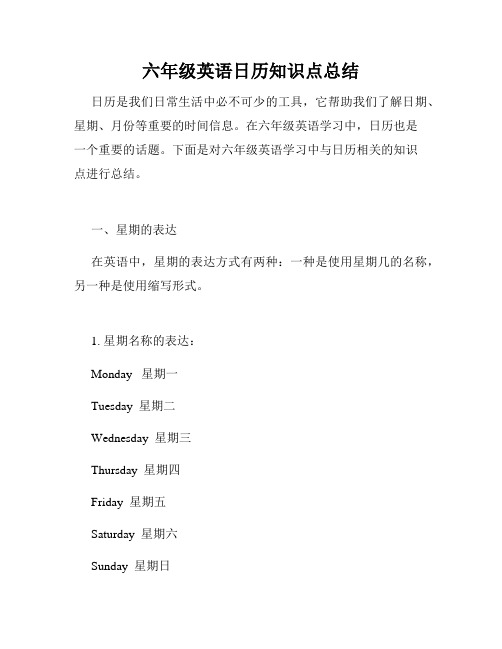
六年级英语日历知识点总结日历是我们日常生活中必不可少的工具,它帮助我们了解日期、星期、月份等重要的时间信息。
在六年级英语学习中,日历也是一个重要的话题。
下面是对六年级英语学习中与日历相关的知识点进行总结。
一、星期的表达在英语中,星期的表达方式有两种:一种是使用星期几的名称,另一种是使用缩写形式。
1. 星期名称的表达:Monday 星期一Tuesday 星期二Wednesday 星期三Thursday 星期四Friday 星期五Saturday 星期六Sunday 星期日2. 星期的缩写形式:Mon. 星期一Tue. 星期二Wed. 星期三Thu. 星期四Fri. 星期五Sat. 星期六Sun. 星期日二、月份的表达在英语中,月份的表达方式需要注意月份名称的正确拼写以及缩写形式的使用。
1. 月份名称的表达:January 一月February 二月March 三月April 四月May 五月June 六月July 七月August 八月September 九月October 十月November 十一月December 十二月2. 月份的缩写形式:Jan. 一月Feb. 二月Mar. 三月Apr. 四月May 五月Jun. 六月Jul. 七月Aug. 八月Sep. 九月Oct. 十月Nov. 十一月Dec. 十二月三、重要的节日和纪念日日历上除了显示日期和星期之外,还会标注一些重要的节日和纪念日。
下面是一些六年级常见的节日和纪念日的英文表达方式:1. New Year's Day 新年2. Chinese New Year 中国新年3. Valentine's Day 情人节4. Women's Day 妇女节5. Arbor Day 植树节6. April Fool's Day 愚人节8. Children's Day 儿童节9. Dragon Boat Festival 端午节10. Mid-Autumn Festival 中秋节11. National Day 国庆节12. Halloween 万圣节13. Christmas 圣诞节四、重要的纪念日和节日的日期对于一些重要的节日和纪念日,我们也需要了解它们具体的日期。
小学六年级英语下册复习题
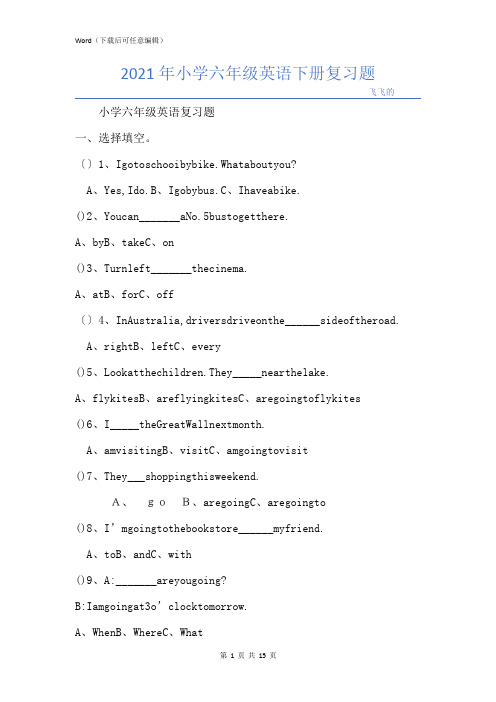
2021年小学六年级英语下册复习题飞飞的小学六年级英语复习题一、选择填空。
〔〕1、Igotoschooibybike.Whataboutyou?A、Yes,Ido.B、Igobybus.C、Ihaveabike.()2、Youcan_______aNo.5bustogetthere.A、byB、takeC、on()3、Turnleft_______thecinema.A、atB、forC、off〔〕4、InAustralia,driversdriveonthe______sideoftheroad.A、rightB、leftC、every()5、Lookatthechildren.They_____nearthelake.A、flykitesB、areflyingkitesC、aregoingtoflykites()6、I_____theGreatWallnextmonth.A、amvisitingB、visitC、amgoingtovisit()7、They___shoppingthisweekend.A、goB、aregoingC、aregoingto()8、I’mgoingtothebookstore______myfriend.A、toB、andC、with()9、A:_______areyougoing?B:Iamgoingat3o’clocktomorrow.A、WhenB、WhereC、What()10、____helikeswimming?A、DoB、IsC、Does( )11、AmyandBetty____singinganddancing.A.likeB、likesC、liking()12.Look,heis_____actorandhismotheris____TVreporter.A、an,aB、a,anC、a,a()13.A:Whatdoesshedo?B:She__________.A、isateacherB、teachesmathC、isamother()14_______doeshegotoschool?A、WhereB、HowC、What〔〕15.Doesthewatercome____thecloud?A.inB.atC.from〔〕16.Where_____thevapourcomefrom?A.doB.doesC.is〔〕17.Canyougowith________?A.heB.hersC.me()18.What’syourfatherlike?A.Helikesswimming.B.He’sadoctor.C.He’stall.〔〕19A:.Whatdoesshedo?B:She________.A.teachesEnglishB.likessingingC.issinging〔〕20.Sheoftenplays_____piano,butshedoesn’tplay_______football.A.\,\B.the,\C.\,the()21.We______tovisitourgrandparentsyesterdayafternoon.A.goB.goesC.went()22.The_______arerunningonthegrass.A.sheepB.goatC.monkey ()23._______________________?It’sblue.A.Whatcolourisyourbag?B.Whereisyourbag?C.Howmuchisyourbag?〔〕24.A:__________?Hesanganddanced.A.WhatdidhedoinXinjiang?B.WhatdoeshedoinXinjiang?C.WhatishedoinginXinjiang?()25.Thesunis________thanthemoon.A.bigB.biggerC.biger()26.Herbagisheavierthan__________.A.myB.mineCme()27.What’sthematter_______you?A.withB.ofC.()28.Thereare_________onthelake.A.agooseB.somegeeseC.whitegoose()29.Didyouhelpthem________theroom?A.cleanedB.cleanC.cleaning()30.Areyouthinandtall?A.Yes,I’m.BNo,Iam.C。
新PEP小学英语六年级总复习资料

新PEP小学英语六年级总复习资料小学英语教材所选内容均来源于学生学习及日常生活,为学生所熟悉的。
因此,教师得抓住时机,充分运用教材,从起始年级,培养学生良好的说话的习惯。
小编在这里整理了英语相关知识,快乐看看吧!新PEP小学英语六年级总复习资料一. 反义词big(大的)--- small(小的) black(黑色)---white(白色) free(闲的)---busy(忙的)hot(热)---cold(冷) same(相同的)祝福您及家人身体健康、万事如意、阖家欢乐!祝福同学们快乐成长,能够取得好成绩,为祖国奉献力量!祝福您及家人身体健康、万事如意、阖家欢乐!祝福同学们快乐成长,能够取得好成绩,为祖国奉献力量!---different(不同的) cool(凉爽)---warm(暖和)tall(高的)---short(矮的) long(长的)---short(短的) young(年轻的)---old(老的)here(这里)---there(那里) before(之前)---after(之后) new(新的)---old(旧的)二. 单词归类1.国家(country)China中国 America美国 Australia澳大利亚 Japan日本England英国 Canada加拿大 France法国2.国籍(nationality)Chinese中国人American美国人Australian澳大利亚人Japanese日本人English英国人 Canadian加拿大 French 法国人3.语言(language)Chinese汉语 Japanese日语 English英语 French 法语4.科目(subject)Chinese语文 maths 数学 English 英语 art 美术music音乐 P.E. 体育 computer 电脑 science科学5.星期(week)Sunday星期日 Monday星期一 Tuesday星期二 Wednesday星期三Thursday星期四 Friday星期五 Saturday星期六6.季节(season) spring 春天 summer夏天 autumn秋天 winter 冬天7.月份(month)January一月 February 二 March三月 April四月 May五月 June 六月July 七月August 八月September 九月October 十月November十一月 December十二月8.节日(festival)Spring Festival 春节 Dragon Boat Festival龙舟节 Mid-autumn Festival中秋节New Year’s Day元旦National Day 国庆节Children’s Day儿童节Easter复活节 Halloween万圣节 Christmas 圣诞节Women‘s Day妇女节Teacher’s Day 教师节May Day劳动节9.患病(illness): have a fever发烧hurt疼痛have a cold感冒have a toothache牙疼have a headache头疼have a sore throat喉咙疼10.食物(foods)cake蛋糕 mooncake月饼 dumpling 饺子 bread 面包 pork猪肉fish鱼肉chicken 鸡肉meat肉beef 牛肉egg鸡蛋rice米饭soup汤 salad 沙拉 sandwich三文治 pizza 比萨饼 hamburger 汉堡包 noodles 面条11.时间(time)year年month 月week周date日期day 白天hour 小时morning早上afternoon下午evening晚上yesterday昨天today今天tomorrow明天 next week下个周 last weekend上个周末 last year 去年 the day before yesterday前天 two months ago12.服装(clothes)T-shirt T恤衫 sweater毛衣 coat 大衣 shorts短裤 jeans牛仔裤hat帽子cap帽子 shoe鞋子 sock 短袜 glove 手套scarf 围巾dress连衣裙skirt短裙shirt衬衫13.动物(animals)chicken鸡 duck鸭 goose鹅 dog狗 cat 猫 pig猪 sheep绵羊goat 山羊horse马lion狮子tiger老虎elephant 大象snake蛇kangaroo 袋鼠 monkey 猴子bear 熊 panda熊猫 whale鲸 hen母鸡 mouse老鼠 giraffe长颈鹿 deer鹿14.颜色(colour)grey 灰色 red红色 green绿色 yellow黄色 blue蓝色 white白色 black黑色pink粉红色 orange橙色 brown褐色 purple紫色15.饮料(drinks):juice汁 milk 牛奶 Coke可乐 tea茶 coffee 咖啡 water 水16.数字基数词:one 一 two 二 three三 four四 five五 six 六 seven七eight八 nine 九 ten十 eleven 十一 twelve 十二 thirteen 十三 fifteen 十五 twenty二十thirty 三十 forty 四十 fifty五十 hundred 百 thousand 千 million 百万序数词:first 第一 second第二 third第三 fifth第五 sixth第六seventh第七eighth第八ninth第九twelfth 第十二twentieth 第二十thirtieth第三十17.植物、水果蔬菜tree 树 flower花 grass草 fruit 水果 apple苹果 pear 梨 orange 橙 banana 香蕉 grape葡萄 peach桃子 strawberry草莓watermelon 西瓜pineapple菠萝vegetable蔬菜tomato西红柿potato马铃薯onion洋葱 cabbage卷心菜 green beans豆角18.职业(jobs)worker工人 farmer农民 doctor医生 nurse护士 teacher 教师driver司机 cook厨师 police officer警察 singer歌唱家cleaner清洁工postman邮递员fisherman 渔夫pilot飞行员coach教练businessman商人19、自然界sun太阳 moon月亮 star星星 sky天空 river江河 lake 湖 sea大海 hill山mountain山脉 snow雪 wind风 cloud云 rain雨20、天气(weather)sunny阳光明媚的windy有风的cloudy多云的snowy下雪的rainy下雨的 dry干燥的wet湿的 warm暖的 cool凉爽的 cold冷的 hot热的21、人体部分head头 hair头发 hand手 face脸 eye眼 ear耳朵 nose鼻子 leg 腿 foot脚22、人people人们 man男人 woman妇女 child小孩 grandparents祖父母 parents父母 father父亲 mother母亲 sister姐妹 brother兄弟cousin堂兄 uncle舅舅、叔叔 aunt阿姨23、文具pen钢笔 pencil铅笔 rubber橡皮 ruler尺 knife小刀 map地图dictionary字典24、建筑与房屋部分bedroom卧室living-room客厅kitchen厨房study书房washroom 卫生间 garden花园 office办公室 bank银行 school学校hospital医院cinema电影院park公园zoo动物园shop商店bookstore书店supermarket超市library图书馆museum博物馆post office邮局TV station电视台hotel宾馆wall墙floor 地板window 窗 door门25.日用品lamp台灯 light灯 telephone电话 clock钟 fridge冰箱 cup杯glass玻璃杯 box盒子 bowl碗26.方位词left左 right右 in front of 在前面 behind后面 near附近 next to与相邻27.家具bed床 desk书桌 table桌子 chair椅子 shelf 书架sofa沙发28.餐食meal一顿饭 breakfast早餐 lunch 午餐 dinner晚餐29.交通工具bus公共汽车 train火车 car小汽车 bike自行 ship轮船 boat小船 plane飞机 ferry轮渡 subway地铁 taxi出租车30.外貌tall高的 short矮的 fat胖的 thin 瘦的healthy健康的 nice好看的 beautiful(pretty)美丽的strong强壮的 old 老的 young 年轻的 heavy重的31.性格clever(smart)聪明的active活跃的quiet安静的shy 害羞的hard-working勤奋的strict严厉的kind和蔼的polile 有礼貌的helpful乐于助人的能干的四.动词词组go shopping去购物 go fishing去钓鱼 go boating去划船 go swimming 去游泳go skiing 去滑雪 go skating去溜冰 go for a walk 去散步 go hiking去远足 go on a picnic去野餐 go camping去野营 go to the cinema 去看电影 go to bed去睡觉 go to school去上学 go to work 去上班 go back回来 go out出去play football 踢足球play basketball打篮球play table tennis(play ping-pong)打乒乓球play badminton 打羽毛球 play the piano 弹钢琴 play games 玩游戏 write a letter写信listen to music听音乐 watch TV 看电视 see a film 看电影 take photos(pictures)照相clean the room打扫房间 wash clothes洗衣服 draw a picture 画画 have breakfast 吃早餐 have lunch 吃午餐 have dinner 吃晚饭do housework 做家务do my homework做作业have a Chinese lesson 上语文课take a dancing class上舞蹈课do morning exercises晨练pick apples 摘苹果plant trees种树wait for等候make cakes 做蛋糕 make the bed 铺床make a card 做卡片look for 寻找 put on穿上 wake up醒来 get up 起床五. 介词短语a pair of 一双 a lot of 许多 on the farm在农场 in front of在…前面 in the sky 在空中 on foot步行 in the morning 在早上in the afternoon在下午 in the evening在晚上 at night在晚上 at school 在学校 at home在家六、易错词汇1. a, an的选择: 元音字母开头的单词用an,辅音字母开头的单词用a.2. am , is , are的选择: I 用 am , you 用 are. 第三人称单数用is , 复数都用are.3. have , has 的选择: 表示某人有某物。
2024年人教版小学六年级上学期期末英语试题与参考答案

2024年人教版英语小学六年级上学期期末复习试题与参考答案一、听力部分(本大题有12小题,每小题2分,共24分)1、Listen to the dialogue and answer the question “What is the date today?” (A) October 15th, 2022 (B) December 20th, 2022 (C) September 10th, 2022Answer: A解析: 听力短对话中提到日期是10月15日,2022年。
选择题的答案是(A) October 15th, 2022。
2、 Listen to the sentence and choose the correct picture.Sentence: It’s a rainy day. (A) A sunny day with clear blue sky (B) A rainy day with dark clouds (C) A snowy day with a white groundAnswer: B解析: 听力句子说“今天是下雨天”,正确选项应该是下雨天的图片,即含有乌云的图片。
选择题的答案是(B) A rainy day with dark clouds。
3、Listen to the conversation between two students in a school library and choose the correct answer:A. They are discussing the weather.B. They are borrowing a book from the librarian.C. They are commenting on the new school uniforms.D. They are planning a school trip.Answer: CExplanation: The conversation indicates that one student is commenting on the new school uniforms, which is the focus of their discussion.4、Listen to the following instructions and answer the question:Teacher: “For this activity, you will need a piece of paper, a pen, and a calculator. First, write down the number 2. Next, apply the square root operation to it. Finally, add the result to the original number.”Choose the correct statement:A. The final result will be 5.B. The final result will be 4.C. The final result will be 8.D. The final result will be 2.Answer: DExplanation: The process described involves taking the square root of 2, which is approximately 1.4142, and then adding it to the original number, 2. Thus, 1.4142 + 2 = 3.4142, which is closest to the option D.5.You are listening to a conversation between a teacher and a student. The teacher is asking the student about his weekend plans. Listen carefully and choose the correct answer.A. The student is planning to visit his grandparents.B. The student is planning to go to the beach.C. The student is planning to stay home and study.Answer: BExplanation: In the conversation, the student says, “I’m going to the beach with my family this weekend.” Therefore, the correct answer is B.6.Listen to a short dialogue between two friends discussing their favorite subjects at school. Choose the correct answer based on the dialogue.A. The girl likes English the most.B. The boy likes math the most.C. They both like science the most.Answer: AExplanation: In the dialogue, the girl says, “I love English class, it’s so interesting!” While the boy mentions, “Math is my favorite subject, it’s challenging.” Therefore, the correct answer is A, as the girl likes English the most.7、Listen and choose the best answer:You hear a conversation about animals.(A)A cat(B)A dog(C)A birdAnswer: (A) A catExplanation: In the conversation, the speaker mentions that the animal has sharp claws and likes to climb trees. This description is typical of a cat.8、Listen and choose the best answer:You hear a person talking about their family.(A)They have a brother and a sister.(B)They have a brother and a cousin.(C)They have a sister and a cousin.Answer: (B) They have a brother and a cousin.Explanation: In the conversation, the speaker mentions that they have a brother, and their cousin also lives with them. This means the person has a brother and a cousin, not a brother and a sister.9、Listen to the conversation and choose the best answer to the question you hear.Question: What does the boy want to do after school?A. Play soccer.B. Go to the library.C. Watch a movie.Answer: BExplanation: The boy says, “I think I’ll go to the libr ary after school, since I need to finish my homework.” This indicates his intention to go to the library after school.10、Listen to the dialogue and fill in the blank with the missing word you hear.Question: They are discussing the weather forecast. Which word best completes the sentence?Every morning, Mom checks the weather report on the TV to see if there willbe any [__] today.A. rainB. windC. snowAnswer: AExplanation: The dialogue might include a sentence like, “And it looks like it might rain this afternoon,” which would indicate that the word “rain” is the appropriate completion for the sentence.11.What is the name of the new school mascot?A. TigerB. LionC. BearD. ElephantAnswer: AExplanation: The new school mascot is a tiger, as mentioned in the conversation between the student and the teacher.12.How does the school plan to celebrate the end of the school year?A. A graduation ceremonyB. A sports dayC. A music festivalD. A science fairAnswer: AExplanation: The school plans to celebrate the end of the school year with a graduation ceremony, as mentioned by the school principal in the announcement.二、选择题(本大题有12小题,每小题2分,共24分)1、What does a tomato grow on?A. a doorB. a fenceC. a treeD. a wallAnswer: B. a fenceExplanation: Tomatoes are typically grown on a fence or a support structure in a garden to provide them with the necessary support for growth. They do not grow on doors, trees, or walls.2、What is the capital of Australia?A. SydneyB. MelbourneC. CanberraD. BrisbaneAnswer: C. CanberraExplanation: Canberra is the official capital city of Australia, where the national government is located. Sydney and Melbourne are large and important cities in Australia, but they are not the capital. Brisbane is the capital ofthe state of Queensland.3、Choose the word that best completes the sentence.Mike usually keeps his room ________.A. cleanB. tidyC. neatD. dirtAnswer: BExplanation: The correct word to describe the condition of Mike’s room should be “tidy”, which means well-organized and clean without being cluttered. “Clean”, “neat”, and “dirt” do not fit the context as precisely as “tidy” does.4、Mark the sentence as “TRUE”, “FALSE”, or “NOT GIVEN” based on the information in the passage.The passage states that Lily now enjoys reading all kinds of books.A. TRUEB. FALSEC. NOT GIVENAnswer: BExplanation: Although the passage does mention Lily developing an interest in reading, there is no specific mention that she now enjoys reading all kinds of books. Thus, the answer is “NOT GIVEN”, as we cannot confirm the statementwith the information provided. If the passage explicitly said that Lily enjoys reading all kinds of books now, then the answer would be “TRUE”.5.Choose the correct word to complete the sentence.The teacher asked the students to________the classroom.A. tidyB. cleanC. dustD. sweepAnswer: AExplanation: The correct word to complete the sentence is “tidy,” as it means to make something neat and orderly. The other options refer to cleaning processes that are more specific but do not fit the context of the sentence as well. “Clean” and “sweep” are actions that involve removing dirt or dust, while “dust” specifically refers to the act of removing dust particles.6.Select the sentence that is a correct question.A. She can swim well.B. Can she swim well?C. She swims well.D. Swim well, can she?Answer: BExplanation: The correct question form is “Can she swim well?” This is a yes/no question that correctly uses the auxiliary verb “can” followed bythe subject “she” and the main verb “swim” in its base form. The other options are no t in the correct question form. “She can swim well” is a statement, “She swims well” is a positive statement, and “Swim well, can she?” is a mix-up of the question word order.7、 What is the weather like in Beijing during winter?A. It’s hot.B. It’s cold.C. It’s rainy.Answer: B. It’s cold.Explanation: Beijing experiences cold weather during winter due to its geographical location and climate conditions. The temperature can drop below freezing, making it necessary to wear warm clothing during this season.8、 Which of the following is a correct sentence?A. Me and Linda goes to the park every weekend.B. Liu Tao and I go to the library on Saturday.C. Lucy and me is going to the zoo.Answer: B. Liu Tao and I go to the library on Saturday.Explanation: In E nglish, the correct form for a subject after “and” should be the subject-verb agreement and pronoun case used correctly. Option B follows the correct form with proper subject-verb agreement and pronoun case.9.The following sentence contains a homophone. Which word is NOT correctly matched with its homophone?A. write / rightB. dear / deviceC. hair / hereD. sea / seeAnswer: BExplanation: Homophones are words that are pronounced the same but have different meanings and spellings. In this case, “dear” and “device” are not homophones, as they do not sound alike. The other pairs (write/right, hair/here, sea/see) are homophones.10.Choose the correct form of the verb that agrees with the subject “Each” in the following sentence.Each of the books______in this library.A. hasB. haveC. isD. areAnswer: AExplanation: The subject “Each” is singular, so the correct form of the verb to use is the singular present simple form. Therefore, the correct verb to complete the sentence is “has,” making the correct sentence “Each of the books has.” The options B, C, and D are incorrect because they suggest the subject is plural or the incorrect tense.11.Choose the correct word to complete the sentence:The cat was sleeping peacefully in the sunbeam. Suddenly, a loud noise it awake.A. wokeB. wakesC. woke upD. wakes upAnswer: C. woke upExplanation: The sentence describes an action that happened in the past (the cat was sleeping), so the correct form of the verb “wake” should be in the past tense. “Woke up” is the cor rect past tense form to describe the cat being awakened from its sleep.12.Select the word that does not belong in the following list:A. appleB. bananaC. orangeD. peachE. onionAnswer: E. onionExplanation: The words “apple,” “banana,” “orange,” and “peach” are all types of fruit. “Onion” is a vegetable, not a fruit, so it does not belong in the list of fruits.三、完型填空(10分)Part III: Reading Comprehension - Fill in the Blanks (10 points)Read the following passage and choose the most suitable word or phrase from the optionsto fill in the blanks.This Christmas, I decided to go to the shopping mall to buy a special gift for my mother. I was looking around for a gift when I saw a pretty scarf. I couldn’t believe my eyes –the scarf 1)_____perfectly with her dress! I knew this was the gift I needed. So, I 2)_____and went to the counter to buy it.Passage analysis:1.The word needs to describe how the scarf fits with her dress.2.The action is about taking some action after finding the gift.Answer Key:1.matched2.picked it upFull Question:1._____(matched/had)2._____(touched/picked it up)I hope this example is helpful for your test preparation!四、阅读理解(26分)Title: The Adventure of the Missing CatReading Passages:Our cat, Whiskers, had always been an inside cat. He loved to curl up in a cozy spot and watch the world go by. One sunny afternoon in the spring, we noticed that Whiskers was nowhere to be found. His disappearance was a surprise since he had never left our house on his own before.Mum went out to search for Whiskers, but there was no sign of him. Dad suggested we check the local park; sometimes cats would roam there. Hours turned into days, and we were beginning to worry that Whiskers might never return.One evening, while walking home from school, I stumbled upon something that excited me. There,趴在公园的长椅上,lap on the warm back of a familiar large grey cat. The cat looked up at me and gave a gentle meow. I knew that familiar grey cat –it was the community vet’s cat,牌照. I walked over and gave him a playful pat.Investigating further, I realized that牌照 was actually Whiskers. He seemed healthy and happy, but I noticed a slightly determined look in his eyes.I asked the vet if牌照的名字是Whiskers,and he confirmed it was.1.What was the unusual thing that happened to the family’s cat, Whiskers?A. Whiskers sneaked out of the house and never came back.B. Whiskers suddenly turned into a grey cat.C. Whiskers always stayed inside and disappeared without a trace.D. Whiskers started living with the community vet.2.How did the main character learn about Whiskers’s whereabouts?A. The vet came to tell them that Whiskers was with them.B. The main character’s friend found Whiskers in the park.C. Whiskers followed the main character home and reintroduced himself.D. The local park director shared the news that Whiskers was found.3.Why did Whiskers have a “slightly determined look in his eyes” after being found?A. He was excited to see the family after his long absence.B. He was looking forward to paying the vet a visit.C. He was confident that his return to the family was part of a greater plan.D. None of the above.Answers:1.C2.A3.A五、写作题(16分)Write a short story about a day you had a great adventure. The story should include the following elements:1.The place where the adventure took place2.The people you met along the way3.The challenges you faced4.How you overcame the challenges5.The lessons you learnedExample:Once upon a time, in the lush green countryside, there was a small village named Willowbrook. One sunny Saturday morning, I decided to take a hike in the nearby forest to explore its beauty.As I entered the forest, I met a friendly old man named Mr. Thompson, who lived nearby. He introduced himself and offered to guide me through the forest. We walked together, chatting about the trees, birds, and wildlife we encountered.Suddenly, we came across a narrow river that blocked our path. The river was deep and fast-flowing, making it impossible to cross. Mr. Thompson suggested we find a way to build a bridge. We gathered some branches, leaves, and vines, and started to construct a makeshift bridge.While we worked, we faced a few challenges. First, the river was too strong to hold the bridge, so we had to reinforce it with more branches. Then, we realized we didn’t have enough vines to tie the branches together. Determined not to give up, we found some strong twine and continued our work.After hours of hard work, we finally completed the bridge. With a big smile, we crossed it together, feeling a sense of accomplishment. As we continued our journey, we encountered more adventures, like helping a lost squirrel find its way home and watching a family of deer play in the meadow.By the end of the day, we had learned that teamwork, perseverance, and creativity could overcome any challenge. I returned home, feeling grateful forthe beautiful memories and the valuable lessons I had learned from my great adventure.解析:这个例子中,作者通过描述一次徒步旅行中的冒险经历,很好地体现了题目要求。
PEP小学六年级的英语总总结复习试卷习题
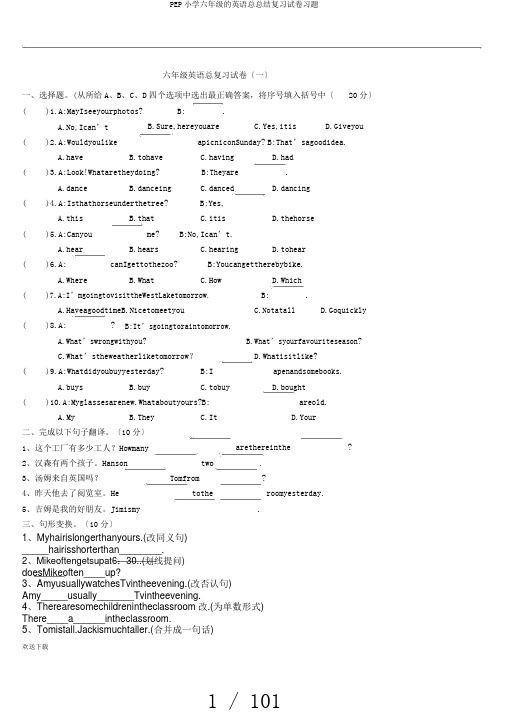
-六年级英语总复习试卷〔一〕一、选择题。
(从所给A、B、C、D四个选项中选出最正确答案,将序号填入括号中〔20分〕()1.A:MayIseeyourphotos?B:.A.No,Ican’tB.Sure,hereyouareC.Yes,itisD.Giveyou ()2.A:Wouldyoulike apicniconSunday?B:That’sagoodidea.A.haveB.tohaveC.havingD.had()3.A:Look!Whataretheydoing?B:Theyare.A.danceB.danceingC.dancedD.dancing()4.A:Isthathorseunderthetree?B:Yes,A.thisB.thatC.itisD.thehorse()5.A:Canyou me?B:No,Ican’t.A.hearB.hearsC.hearingD.tohear()6.A:canIgettothezoo?B:Youcangettherebybike.A.WhereB.WhatC.HowD.Which()7.A:I’mgoingtovisittheWestLaketomorrow.B:.A.HaveagoodtimeB.NicetomeetyouC.NotatallD.Goquickly ()8.A:?B:It’sgoingtoraintomorrow.A.What’swrongwithyou?B.What’syourfavouriteseason?C.What’stheweatherliketomorrow?D.Whatisitlike?()9.A:Whatdidyoubuyyesterday?B:I apenandsomebooks.A.buysB.buyC.tobuyD.bought()10.A:Myglassesarenew.Whataboutyours?B:areold.A.MyB.TheyC.ItD.Your二、完成以下句子翻译。
新PEP六年级英语总复习及练习精选全文完整版

可编辑修改精选全文完整版六年级英语毕业总复习一单词名词动词形容词可数不可数原型进行式过去式第三人称单数原型比较级apple water do doing did does fat fatter(将来时、一般现在时)(一般现在时)单数复数apple apples一、定义:名词可以分为可数名词和不可数名词,不可数名词没有单复数,一律看作单数。
二、可数名词:分为单数和复数⑴单数:以元音音标a e i o u 开头的单数用an(一个),其他用a(一个)或者one +单数复数:some(一些)加复数或者不可数名词;或者大于1的具体数字+复数⑵可数名词单数→复数的变化规则:三、不可数名词:以下词为常为不可数名词,他们的复数形式就是他们本身。
water 水milk牛奶tea 茶rice米饭juice 果汁bread面包meat 肉四、人称代词:be 动词am , is , are的选择: 单数用is , 复数用are,I 用am , you 用are.练习题一、选择a或an或some.pen bag apple big applebananas orange books water二、写出下列各词的复数.watch _______ child _______ day________ foot________ book_______ sheep ______ box_______ peach______ man______fish _______ paper_______三、选择:1、There on the wall .They are very beautiful.A. are photoesB. are photos2、That’s book.A. anB. a3、There some in the river.A. are, fishesB. are ,fish4. Would you like _______ ,please?A. some watersB. some water5、Do you want to drink much ?A、a milkB、milk四、选择be(am is are ) 填空。
(完整版)小学六年级人教版英语总复习及知识点
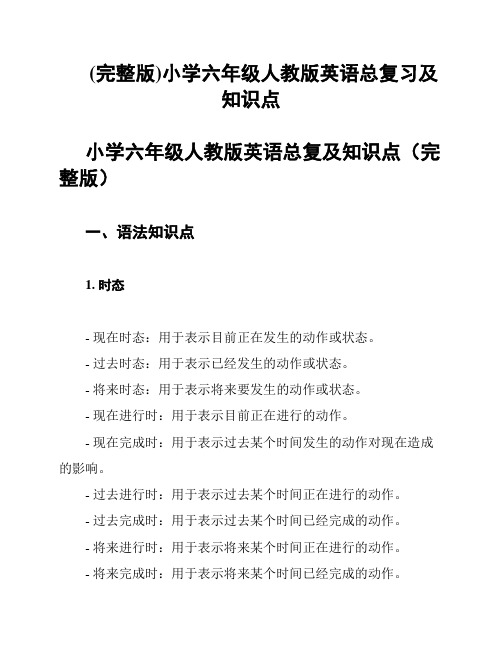
(完整版)小学六年级人教版英语总复习及知识点小学六年级人教版英语总复及知识点(完整版)一、语法知识点1. 时态- 现在时态:用于表示目前正在发生的动作或状态。
- 过去时态:用于表示已经发生的动作或状态。
- 将来时态:用于表示将来要发生的动作或状态。
- 现在进行时:用于表示目前正在进行的动作。
- 现在完成时:用于表示过去某个时间发生的动作对现在造成的影响。
- 过去进行时:用于表示过去某个时间正在进行的动作。
- 过去完成时:用于表示过去某个时间已经完成的动作。
- 将来进行时:用于表示将来某个时间正在进行的动作。
- 将来完成时:用于表示将来某个时间已经完成的动作。
2. 语法结构- 名词:用于表示人、动物、物体、地点等。
- 动词:用于表示动作或状态。
- 形容词:用于描述名词的特征或状态。
- 副词:用于修饰动词、形容词或其他副词。
- 介词:用于表示位置、时间或关系等。
- 代词:用于替代名词。
- 数词:用于表示数量。
- 冠词:用于限定名词的范围。
- 连词:用于连接词语、短语或句子。
3. 句子结构- 主语:句子中执行动作或承受动作的人或事物。
- 谓语:句子中说明主语动作或状态的部分。
- 宾语:句子中接受动作的人或事物。
- 定语:用于修饰名词或代词的成分。
- 状语:用于修饰动词、形容词、副词或整个句子的成分。
- 表语:用于说明主语的状态或特征的部分。
二、总复内容1. 单词- 请根据教材中的单词表,复并牢记相关的单词拼写和意思。
2. 句子- 复教材中的对话和句子,理解并掌握其基本意思和用法。
3. 对话- 复教材中的对话,掌握其中的日常生活用语和表达方式。
4. 语法- 复教材中的语法知识点,加深对时态、语法结构和句子成分的理解。
三、研究方法1. 多听多说- 多听英语教材、歌曲或英语广播,提高听力水平。
- 多说英语,练口语表达和语音准确性。
2. 多读多写- 多读英语教材、故事书等,提高阅读理解能力。
- 多写英语作文,锻炼自己的写作能力和语法运用。
六年级英语每天必考知识点
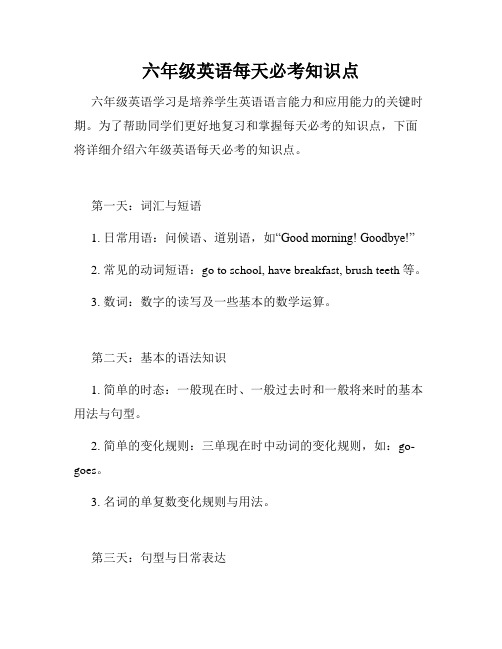
六年级英语每天必考知识点六年级英语学习是培养学生英语语言能力和应用能力的关键时期。
为了帮助同学们更好地复习和掌握每天必考的知识点,下面将详细介绍六年级英语每天必考的知识点。
第一天:词汇与短语1. 日常用语:问候语、道别语,如“Good morning! Goodbye!”2. 常见的动词短语:go to school, have breakfast, brush teeth等。
3. 数词:数字的读写及一些基本的数学运算。
第二天:基本的语法知识1. 简单的时态:一般现在时、一般过去时和一般将来时的基本用法与句型。
2. 简单的变化规则:三单现在时中动词的变化规则,如:go-goes。
3. 名词的单复数变化规则与用法。
第三天:句型与日常表达1. WH疑问句的基本用法,如:What's your favorite color?2. 简单的情态动词的用法,如can, could, may等。
3. 日常生活中常用的句型,如:Can I have a glass of water, please?第四天:听力与口语训练1. 听力理解:根据听到的语音内容,选择正确的图片或回答问题。
2. 口语训练:练习与他人进行简单的交流,如问候、询问、回答等。
3. 短文跟读:跟读简短的英语短文,提高口语表达能力。
第五天:阅读与写作技巧1. 阅读理解:阅读短文,并回答相关问题。
2. 阅读技巧:掌握快速阅读和扫读的技巧,提高阅读效率。
3. 写作技巧:学习书写格式,如书信、日记、小作文等。
第六天:语法与语言运用1. 情态动词的更多用法,如:should, must, might等。
2. 复合句的基本结构和常见的连词,如:and, but, because等。
3. 写作训练:通过写作提高语言表达和书写能力。
第七天:复习与测试1. 回顾一周的学习,复习重点知识点。
2. 进行英语能力测试,检测自己对所学知识的掌握情况。
3. 根据测试结果,总结薄弱环节,准备下一周的学习计划。
【推荐】陕旅版小学英语六年级总复习 (1)

第一部分:音标a 在开音节中[ei] name 名字plane飞机baby婴儿cake 蛋糕在闭音节中[æ] bag书包dad父亲hat帽子map地图e 在开音节中[i:] he他these这些me我Chinese 中国人在闭音节中[e] bed 床let让pen钢笔desk 桌子yes是egg鸡蛋i 在开音节中[ai] bike自行车fly 飞drive开车time时间nice 漂亮的kite 风筝在闭音节中fish鱼big 大drink喝sit坐milk 牛奶swim 游泳o 在开音节中[ou] those那些close关闭go 去home家no 不在闭音节中[C] clock闹钟not不box 盒子shop 商店sock袜子u 在开音节中[ju:] student学生excuse 打扰duty值日Tuesday 星期二在闭音节中[∧] bus汽车cup杯子jump 跳much lunch午饭二、元音字母在重读音节中的特殊读音a在[w]音后面[C] want what watch washa在f n sk ph sp ss st th前[α:] after plant ask glass fast fatheri [ai] find child light higho [ou] most old coldo [∧] come monkey love mother第二部分:基础知识1.基础知识部分一、复数一般情况加s 特殊情况sh/ch/x结尾加es 还有单复数同形不做变化的。
1. yourself(复数形式)yourselves2.knife(复数形式)knives3.fish(复数形式)fishes4.meat(复数形式)meat5.rice(复数形式)rice 6. sheep复数sheep 7. people复数people 8. bread(复数形式)bread 9. is(复数形式) are10.potato--potatoes 11.tomato---tomatoes二、单数1.we(单数)I2. they(单数)he/she/it三、现在分词/ing形式,分为直接加ing;双写加ing;去e加ing.1.swim/ swimming2.have/having3.make/makinge/coming5.take/taking6.boat/boating7.do/doing8.keep/keeping9.run/running10.rain/raining 11.climb/climbing四、过去分词/过去式一般情况加ed 特殊情况特殊记忆结合课本最后的过去分词表背诵1.go/went2.get/got3.see/saw4.is/was5.do/did6.are/were7.have/had9.give/gave10.make/made11. begin/begun2.单词基础部分一、扩写与缩写1.is ’s2.am ’m3.are ’re4.not n’t ’s6.will ’ll7.would ’d二、缩写1.that is that’s2.what is what’3.who is who’s4.I am I’m5.they are they’re6.let us let’s7.can not can’t8.I will I’ll9.does not dosen’t10.could not couldn’t 11.she is she’s 12.he is he’s 13.It is It’s 14.we are we’re 15.you are you’re16.do not don’t 17.did not didn’t 18. is not isn’t19.I would I’d 20. have not haven’t三、扩写1.let’s let us2.we’re we are3.It’s It is4.that’s that is5.they’re they are6.didn’t did not7.don’t do not 8.haven’t have not 9.what’s what is10.can’t can not 11.who’s who is 12.doesn’t does not13.I’d I would 14.she’s she is 15.I’m I am16.he’s he is 17.I’ll I will一、同音词right与write aren’t与aunt knot与not meet与meattwo与too know与no sea与see二、同义词photo与picture Hello与Hi good与nice mum与motherfather与dad like与love a/an与one三、反义词/对应词right与wrong/left same与different thin与fatold与new/young short与 tall clean与dirty down与up Yes与No come与go here与there early与late hot与cold weak与strong hungry与full boy与girl四、单数第三人称形式have单三has do单三does like单三likes go单三goes pick单三picks eat单三eats五、其他1.a(另一种形式)an2.two(序数词) second3.one(序数词)first4.three(序数词)third小学英语单词总汇1. 动物类(animals)cat猫pig猪dog狗rabbit兔子mouse老鼠elephant大象panda熊猫tiger老虎duck鸭子fish鱼bird鸟monkey猴子chicken小鸡lion狮子sheep绵羊horse马giraffe长颈鹿goat 山羊wolf狼goose鹅snake蛇bear熊kangaroo袋鼠cow奶牛2. 颜色(colour)blue蓝red红white白yellow黄green绿black黑pink粉红purple紫brown棕orange橙3. 身体部位(body)head 头hair头发eye眼睛ear耳朵nose鼻子face脸neck 脖子arm手臂leg腿foot脚mouth嘴hand手finger手指toe 脚趾4. 数字(numbers)one一two二three三four四five五six六seven七eight八nine九ten 十eleven十一twelve十二thirteen十三fourteen十四fifteen十五sixteen十六seventeen十七eighteen十八nineteen十九twenty二十twenty-one二十一thirty三十forty四十fifty五十sixty六十seventy七十eighty八十ninety九十one hundred一百first 第一second第二third第三forth第四fifth第五sixth 第六seventh第七eighth第八ninth第九tenth第十5. 时间日期(time)year年season四季week周 A.M. (a.m.) morning上午P.M. (p.m.) afternoon下午day日spring春天summer夏天fall秋天winter 冬天yesterday昨天tomorrow 明天Monday星期一Tuesday星期二Wednesday星期三Thursday星期四Friday星期五Saturday星期六Sunday星期天weekend周末Jan.(January) 一月Feb. (February) 二月Mar. (March) 三月Apr. (April) 四月May五月June六月July七月Aug. (August) 八月Sept. (September) 九月Oct. (October) 十月Nov. (November) 十一月Dec. (December) 十二月6. 天气和温度(weather)cold冷的cool凉爽的warm温暖的hot热sunny晴朗的cloudy多云的windy有风的rainy下雨的snowy下雪的7. 交通工具car小汽车bus公共汽车bike自行车plane飞机train火车ship轮船taxi出租车boat小船on foot步行8. 食物饮料三餐味道水果breakfast早餐lunch午饭supper晚饭dinner晚饭,正餐meals三餐rice 米饭noodles面条egg蛋cake蛋糕bread 面包tofu豆腐hot dog热狗hamburger汉堡包noodles面条soup汤chicken鸡肉meat肉pork猪肉beef牛肉vegetable蔬菜fish鱼potato 土豆green beans 青豆tomato 西红(drink)coffee咖啡tea茶water水juice果汁Coke可乐ice-cream冰激凌ice冰milk牛奶(fruit)orange桔子apple苹果pear梨strawberry草莓banana香蕉grapes葡萄lemon柠檬peach桃子watermelon西瓜9.职业(jobs)doctor医生driver司机singer歌手farmer农民nurse护士teacher教师student学生writer作家actor男演员actress女演员cleaner清洁工engineer工程师TV report 电视台记者artist 画家policeman 警察accountant 会计salesperson销售员player运动员10. 反义词big---small大的/小的long ---short长的/短的tall--- short高的/矮的thin--- fat瘦的/胖的heavy---light重的/轻的happy--- sad高兴的/悲伤的open---close打开/关上good--- bad好的/坏的new---old新的/旧的old ---young年长的/年青的cold ---hot冷的/热的far---near 近的/远的right---left右边/左边east---west东面/西面south---north南面/北面go---come 来/去up---down 上/下here---there这里/那里11. 衣服(clothes)T-shirt T恤衫shirt衬衫skirt短裙shoes鞋子dress连衣裙hat帽子jacket 夹克衫socks袜子sweater毛线衣coat 外套boots靴子jeans牛仔裤shorts短裤pants长裤slippers拖鞋sandals凉鞋vest背心sneakers运动鞋12.地方(place)home家room房间bedroom卧室bathroom卫生间kitchen厨房living room客厅study书房school学校classroom 教室gym体育馆playground操场canteen餐厅park公园art room美术室farm农场library图书馆teacher’s office老师办室computer room计算机教室music room音乐教室post office邮局hospital医院cinema电影院bookstore 书店nature park自然公园zoo动物园bank银行garden花园pet shop宠物店supermarket超市museum 博物馆shop 商店13. 代词I 我you你he他she她it它we我们you 你们they 他(她、它)们my我的your你的his 他的her她的its它的our我们的your你们的their他(她、它)们的14.方位及方位介词south南north北east东west西left左边right右边in在…里on在…上under在…下面near在…旁边behind在…后边next to与…相邻over在…上面in front of在…前面15.心情及患病happy高兴的sad伤心的bored无聊的angry生气的excited兴奋的tired疲劳的sick有病的hurt疼痛have a fever发烧have a cold感冒have a toothache牙疼have a headache头疼have a sore throat喉咙疼16.自然景物sky天空sun太阳cloud云wind风rain雨star星星moon月亮air空气rainbow彩虹river河流lake湖泊stream小溪sea大海bridge桥forest森林path小道road公路mountain山building建筑物city城市village乡村17.疑问词what什么what day星期几what color什么颜色what time什么时间why为什么who 谁where哪里which one哪一个when什么时候which哪一个how多么,怎样how old 几岁how many多少how tall 多高how much多少钱18. 国家语言及首都China中国Chinese中国的,中国人的,汉语Beijing 北京England英国English英语,英国的,英国人London伦敦the USA美国America美国的,美国人New York纽约Japan日本Canada加拿大Austrian澳大利亚19.植物(plant)tree树flower花grass草seed种子sprout苗leaf叶子20. 动词词组swim游泳fly飞jump跳walk走run跑sleep睡觉drink water喝水get up起床go to bed起床go home回家go to school去上学go swimming去游泳go fishing去钓鱼go shopping买东西go hiking去远足go skiing滑雪go skating滑旱冰go ice-skating滑冰play sports做运动play ping-pong打乒乓play football踢足球play the piano弹钢琴play chess 下棋play computer games玩电脑游戏play the violin拉小提琴listen to music听音乐watch TV看电视read a book看书write a letter写信write an e-mail写邮件write a report写报告take pictures拍照片sing and dance唱歌跳舞draw pictures 画画fly kites 放风筝watch insects观察昆虫make kites 做风筝pick up leaves摘树叶do an experiment做实验catch butterflies抓蝴蝶count insects数昆虫collect stamps 收集邮票have a picnic野餐do homework做家庭作业eat breakfast吃早餐do morning exercises晨练have English class 上英语课plant trees种树visit grandparents看望爷爷奶奶make a snowman堆雪人ride a bike骑车climb a mountain爬山row a boat 划船take a trip 旅游do housework做家务clean the room打扫房间cook dinner做晚饭make the bed铺床wash clothes洗衣服do the dishes洗碗sweep the floor扫地set the table摆饭桌answer the phone接电话water the flowers浇花empty the trash 倒垃圾21.文具、家具等物品bag书包pen钢笔pencil铅笔ruler尺子eraser橡皮book 书pencil-case铅笔盒bed床light灯sofa沙发chair椅子desk课桌table 桌子wall墙TV电视door门window窗户floor地板board写字板glass玻璃杯fan风扇mirror镜子curtain窗帘trash bin垃圾箱closet衣柜phone 电话box盒子shelf书架fridge冰箱computer电脑,计算机teacher’s desk讲台sharpener卷笔刀notebook笔记本dictionary词典comic book漫画书post card明信片newspaper报纸story-book故事书picture图片,照片22. 性别及家庭成员boy 男孩girl女孩Mrs 女士Mr.先生Miss小姐mother母亲mum妈妈(口语)father 父亲dad爸爸(口语)parents 父母grandmother祖母grandma奶奶(口语)grandfather祖父grandpa爷爷(口语)uncle叔叔aunt阿姨sister姐妹brother 兄、弟son儿子baby婴儿friend朋友23. 动词过去式规则变化:play ---played wash---washed watch---watched climb---climbed visit---visited listen---listened dance---danced learn---learned row---rowed cook---cooked clean---cleaned不规则变化:go---went do---did take---took sing---sang see---saw fly---flew eat---ate have---had swim---swam buy---bought read---read24.形容词比较级long---longer shorter---shorter young---younger tall---taller old---older strong---stronger small---smallerthin---thinner big---bigger sad---sadder hot---hotterheavy---heavier funny---funnier happy---happiernice---nicer fine---finer large---larger时态总汇:一般现在时:A: When do you go to school? B: I usually go to school at 7:00. A: How do you go to school? B: I go to school on foot. A: What do you do on the weekend? B: I often play ping-pong.Sometimes I go hiking.现在进行时:(ing)A: Hello! B: Hi, John. This is Mike. What are you doing?A: I’m doing homework. What about you? B: I’m listening to music. What is your father doing?A: He’s reading newspapers.一般过去时:A: Where did you go on your holiday? B: I went to Shanghai> A: How did you go there? B: I went by train. A: What did you do there? B: I went shopping. 一般将来时:A: What are you going to do on your holiday? B: I’m going to Beijing.A: How are you going to there? B: I’m going by plane. A: What are you going to do? B: I’m going to the Great Wall.。
人教版小学英语6年级上下两册全部重点知识归纳
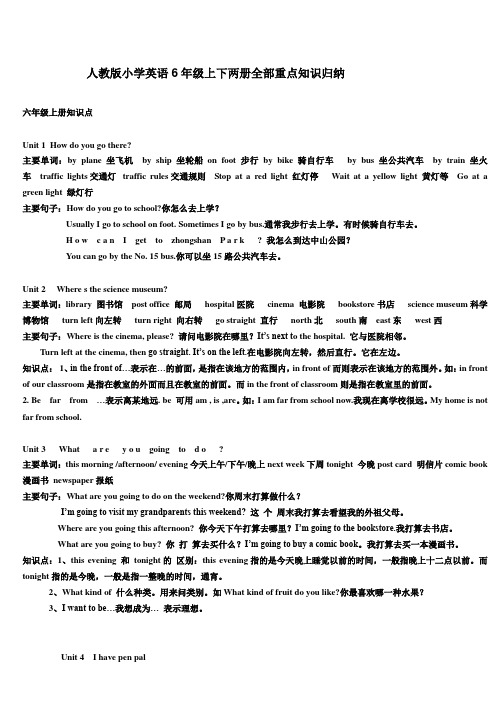
人教版小学英语6年级上下两册全部重点知识归纳六年级上册知识点Unit 1 How do you go there?主要单词:by plane 坐飞机 by ship 坐轮船 on foot步行by bike 骑自行车by bus 坐公共汽车 by train 坐火车 traffic lights交通灯traffic rules交通规则 Stop at a red light 红灯停Wait at a yellow light 黄灯等 Go at a green light 绿灯行主要句子:How do you go to school?你怎么去上学?Usually I go to school on foot. Sometimes I go by bus.通常我步行去上学。
有时候骑自行车去。
H o w c a n I get to zhongshan P a r k ? 我怎么到达中山公园?You can go by the No. 15 bus.你可以坐15路公共汽车去。
Unit 2 Where s the science museum?主要单词:library 图书馆 post office 邮局hospital医院cinema 电影院bookstore书店science museum科学博物馆turn left向左转turn right 向右转go straight 直行north北south南 east东west西主要句子:Where is the cinema, please? 请问电影院在哪里?It’s next t o the hospital. 它与医院相邻。
Turn left at the cinema, then go straight. It’s on the left.在电影院向左转,然后直行。
它在左边。
知识点:1、in the front of…表示在…的前面,是指在该地方的范围内,in front of而则表示在该地方的范围外。
六年级英语知识点归纳整理

六年级英语知识点归纳整理一、单词。
1. 形容词。
- big(大的)、small(小的)、tall(高的)、short(矮的;短的)、long (长的)、fat(胖的)、thin(瘦的)等描述事物特征的形容词。
例如:The elephant is big.(大象很大。
)2. 名词。
- 动物类:cat(猫)、dog(狗)、panda(熊猫)、monkey(猴子)、elephant (大象)、tiger(老虎)等。
如:I like pandas.(我喜欢熊猫。
)- 食物类:apple(苹果)、banana(香蕉)、cake(蛋糕)、bread(面包)、rice(米饭)等。
例如:An apple a day keeps the doctor away.(一天一苹果,医生远离我。
)- 家庭成员类:father(父亲)、mother(母亲)、brother(兄弟)、sister (姐妹)、grandfather(祖父;外祖父)、grandmother(祖母;外祖母)等。
如:My mother is a teacher.(我的妈妈是一名教师。
)3. 动词。
- be动词:am、is、are。
I am a student.(我是一名学生。
)He is my friend.(他是我的朋友。
)They are at school.(他们在学校。
)- 实义动词:like(喜欢)、play(玩)、eat(吃)、drink(喝)等。
例如:I like to play football.(我喜欢踢足球。
)She eats an apple every day.(她每天吃一个苹果。
)二、句型。
1. 主系表结构。
- 肯定句:主语+be动词(am/is/are)+表语。
如:This is my book.(这是我的书。
)- 否定句:主语+be动词(am/is/are)+not+表语。
例如:He is not my brother.(他不是我的兄弟。
六年级英语上册人教版(PEP)第三单元复习
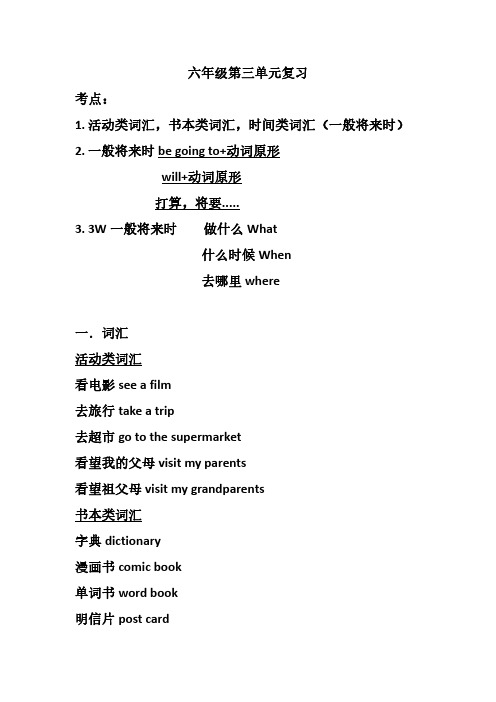
六年级第三单元复习考点:1.活动类词汇,书本类词汇,时间类词汇(一般将来时)2.一般将来时be going to+动词原形will+动词原形打算,将要.....3.3W一般将来时做什么What什么时候When去哪里where一.词汇活动类词汇看电影see a film去旅行take a trip去超市go to the supermarket看望我的父母visit my parents看望祖父母visit my grandparents书本类词汇字典dictionary漫画书comic book单词书word book明信片post card表将来时间结构:1.this+早中晚(今天)this+星期(这个星期几)this+月份(今年几月)this+年(今年)2.next+时间(早中晚/星期/月份/年)表示下一个.....今天早上this morning今天下午this afternoon今天晚上this evening在今晚tonight明天tomorrow这周末this weekend下周next week下周二next Tuesday今年this year明年next year今年七月this July二.一般将来时be going to+动词原打算,将要.....询问别人打算做什么句型:问:What+is/are+主语+going to do(+将来时间)?答:主语+is/are+going to+动词原形.1.你打算做什么?我打算去旅行。
What are you going to do?I am going to take a trip.2.明天你打算做什么?我打算去看电影。
What are you going to do tomorrow?I am going to see a film.3.他打算做什么?他打算去看望祖父母。
What is he going to do?He is going to visit his grandparents.4.她打算做什么?她打算去超市。
六年级英语日历知识点
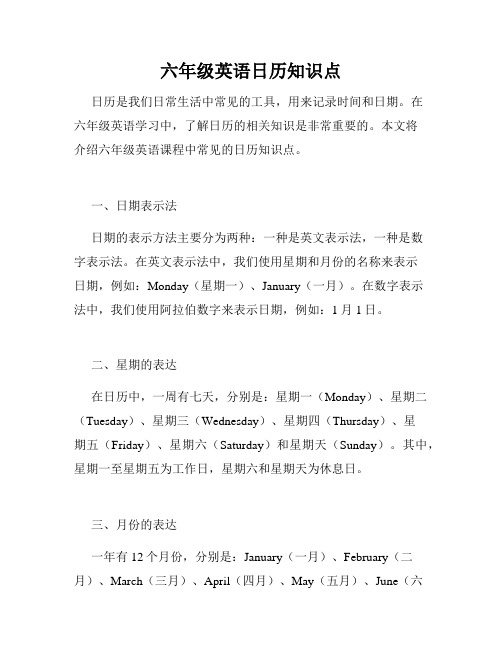
六年级英语日历知识点日历是我们日常生活中常见的工具,用来记录时间和日期。
在六年级英语学习中,了解日历的相关知识是非常重要的。
本文将介绍六年级英语课程中常见的日历知识点。
一、日期表示法日期的表示方法主要分为两种:一种是英文表示法,一种是数字表示法。
在英文表示法中,我们使用星期和月份的名称来表示日期,例如:Monday(星期一)、January(一月)。
在数字表示法中,我们使用阿拉伯数字来表示日期,例如:1月1日。
二、星期的表达在日历中,一周有七天,分别是:星期一(Monday)、星期二(Tuesday)、星期三(Wednesday)、星期四(Thursday)、星期五(Friday)、星期六(Saturday)和星期天(Sunday)。
其中,星期一至星期五为工作日,星期六和星期天为休息日。
三、月份的表达一年有12个月份,分别是:January(一月)、February(二月)、March(三月)、April(四月)、May(五月)、June(六月)、July(七月)、August(八月)、September(九月)、October(十月)、November(十一月)和December(十二月)。
每个月份的天数是不同的,需要仔细记忆。
四、特殊的日子在日历中,有一些特殊的日子需要特别注意。
例如:1. New Year's Day(元旦):每年的1月1日是元旦。
2. Christmas Day(圣诞节):每年的12月25日是圣诞节。
3. Thanksgiving Day(感恩节):每年的11月的第四个星期四是感恩节。
4. Halloween(万圣节):每年的10月31日是万圣节。
五、闰年和平年闰年是指能被4整除的年份,例如:2004年、2008年、2012年等。
而普通年份就是平年,例如:2005年、2006年、2007年等。
闰年的2月份有29天,而平年的2月份只有28天。
通过对以上的知识点的了解,我们可以更好地理解和使用日历,合理安排自己的学习和生活计划。
- 1、下载文档前请自行甄别文档内容的完整性,平台不提供额外的编辑、内容补充、找答案等附加服务。
- 2、"仅部分预览"的文档,不可在线预览部分如存在完整性等问题,可反馈申请退款(可完整预览的文档不适用该条件!)。
- 3、如文档侵犯您的权益,请联系客服反馈,我们会尽快为您处理(人工客服工作时间:9:00-18:30)。
你能把刚刚1-31的基数词都变成序数词吗?
one一 first 第一 1st two二 second 第二 2nd three三 third 第三 3rd four四 fourth第四 4th five五 fifth 第五 5th
Come on,everybody.
看谁记得快
Friday
星期五
who is the best?
看谁记得快
Saturday
星期六
Let's play a game(Wave Game).
看看哪
个组厉害哦
Answer the questions one by one.
Drill:
--What day is today? --It is Sunday/Monday/
Tuesday/Wednesday/
Thursday/Friday/Saturday.
学习了一段时间了,我们来放松一下
what do you find?----刚刚你发现了什么?
months 月份
我们来记一记。
There are twelve months in a year.
January 一月 July 七月 February 二月 August 八月 March 三月 September 九月 April 四月 October 十月 May 五月 November 十一月 June 六月 December 十二月 读一读,记一记。注意首字母都大写。
我们来找规律
一、二、三,单独记;八去t, 九除e, ve要用f替,整十基数变 序数,先把ty变成tie; 要是遇到几十几,十位基数个位 序,th最后加上去。
我们再看看那些序数词。
我们把月份和序数词合起来就得到了日期。
January+first=January first(1st)一月一日 February+second=February second(二月二日) ......那三月三,四月四......直 到十二月十二。你会说吗?
January
February
看谁记得快
一月
二月
看谁记得快
March April May
三月 四月 五月
June July
六月 七月
August
看谁记得快
八月
September 九月
看谁记得快
October 十月
November 十一月
December 十二月
你记好了吗?我们来检查下你的记忆效果。
祝 Thank you,一 帆 See you. 风 Office 顺
.
Make Presentation much more fun
@WPS官方微博 @kingsoftwps
Thanks
我们做几道题来巩固一下
B 1,The first day of a week is______. A,Monday.B,Sunday,C,Saturday. 2,Children's Day is in___________. A A,June.B,July.C,May
3,Teachers' Day is in___________. A A,September.B,October.C,August.
seventeen十七 seventeenth第十七 eighteen十八eighteenth第十八 nineteen十九nineteenth第十九 twenty二十 twentieth第二十 twenty-one,twenty-first第二十一21st twenty-two,twenty-second第二十二 twenty-three,twenty-third第二十三 twenty-four,twenty-fourth第二十四 twenty-five,twenty-fifth第二十五
看谁记得快
Sunday
星期天
who is the best?
看谁记得快
Monday
星期一
who is the best?
看谁记得快
Tuesday
星期二
who is the best?
看谁记得快
Wednesday
星期三
who is the best?
看谁记得快
Thursday 星期四
who is the best?
C 4,When is Tree-planting Day? A,In May.B,In April.C,In March.
Homework
1,请默写出1-12月份的单词。 2,请默写星期日--星期六的单词。 3,试试用英语从5月1日说到5月31日。
summary 小2,月份. 3,日期. 如果按规律记, 记起来就容易了。
twenty-six二十六twenty-sixth第二十六 twenty-seven,twenty-seventh第二十七 twenty-eight,twenty-eihgth第二十八 twenty-nine,twenty-ninth第二十九 thirty三十 thirtieth第三十 thirty-one三十一thirty-first 第三十一 thirty-two三十二thirty-second第三十二 还纠结哦!不过找到规律就好记了。你 找到规律了吗
Welcome to our class
Day and Date
课前热热身吧
Warming-up
•
What do you find?
The days of a week
Let’s learn them!
我们来学习星期。
7 6
1
week
5 3 4
2
注意星期首字母要大写!
who is the best?
现在你知道表达日期了吗?月份+序数词,学以致用。
--What's the date today?
--It's May fifteenth(15th). 对比:--What day is today? --It's Tuesday . 前者问日期,后者问星期。 --When is your birthday? --It is September thirtieth(30th).
你能从1数到31吗?count
one,two,three,four,five, six, seven, eight,nine,ten,eleven,twelve,thirteen fourteen,fifteen,sixteen,seventeen, eighteen,nineteen,twenty,twenty-one twenty-two,twenty-three...twenty-nine, thirty, thirty-one.
Can you ask and answer the qustion in pairs ?
--When is your birthday? --It's in January/February/ March/April/May/June/July/ August/September/October /November/December.
six 六 sixth第六 seven七 seventh第七 eight八 eighth第八 nine九 ninth第九 ten十 tenth第十
eleven十一 eleventh第十一 twelve十二 twelfth第十二 thirteen十三 thirteenth第十三 fourteen十四 fourteenth第十四 fifteen十五 fifteenth第十五 sixteen十六 sixteenth第十六
